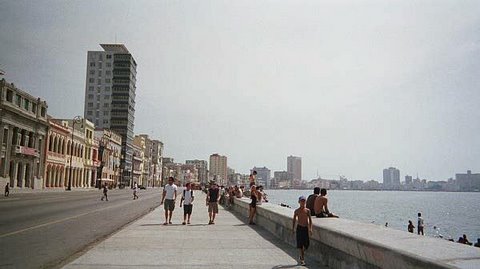
Cuba is often portrayed as a travel destination that creates different worlds for tourists and locals by having two currency systems and keeping locals out of nicer establishments such as resorts and restaurants that are reserved for travelers. The government chooses to import tourists to bring in capital, but do travelers truly benefit the local population or is it a double standard for “wealthy” tourists to live better than ordinary Cubans do in their own country?
The currency most widely used by locals, the peso, is worth 24 times less than the convertible peso used by tourists. Since the government also controls wages, the average salary is low—only around $20 a month, according to the U.S. Department of State. Only convertible pesos can be used for hotels, official taxis, museum entrance fees, nicer restaurants and higher-quality goods such as cigar and rum. As a result, locals with no access to hard currency receive second-quality treatment in their own country.
Still, tourism does help benefit the national economy, says Cuba travel expert Malia Everette, director at Global Exchange Reality Tours. While all major industries are state controlled, money earned from tourists goes to support healthcare and education. Cuba is also beginning to allow the expansion of a microsystem of local businesses – as long as it benefits the entire country. The Telegraph reports that more than 170,000 Cubans have obtained self-employment licenses under new guidelines implemented last year. Everette recommends dining in private homes and tipping generously to help benefit local businesses. While most of the money still goes back to the state, it also provides direct benefits for that business and family.
Many Cubans also offer side services to travelers for extra income, even though it is illegal. Janice Waugh, publisher of the Solo Traveler blog, wrote about her experience with state workers, “There was the taxi driver who gave day tours for $50—almost triple what he would make in a normal day. Street performers busking quite successfully. Artists selling their work in doorways. Dancers (or not) willing to teach how to salsa!”
“Cuba has been changing for decades now, trying to steward and move forward,” says Everette. “I am blown away by the public systems they were able to keep after the embargo.”
In 2008, the government, under Ra˙l Castro, changed its policies to allow Cuban citizens to stay at hotels and resorts previously reserved for tourists, making interaction with locals easier for visitors. However, even with this change, the rooms have to be paid for in convertible pesos, which the average Cuban can still not afford.
Although the socialist government has been slow to move forward, the country may be at a turning point. In April, Cuba held its first congress in 14 years to discuss proposed economic reforms that would, among other things, eliminate the controversial rationing of food and goods and allow the private business sector to grow.
As modern Cuba starts to unfold, tourism can only help to bring in outside capital and expand the private sector. Under these circumstances, it seems unethical to maintain any form of travel embargo and deny the Cuban people that growth.
For more about Cuba, see ET Executive Director Jeff Greenwald’s dispatches from his recent trip.
Read Ethical Traveler's Reprint Policy.
